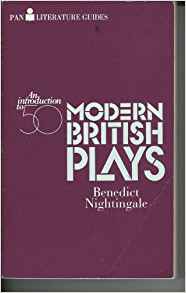| Sharp Portraits of 34 Dramatists |
Theatre History |
| Benedict Nightingale “An Introduction to 50 Modern British Plays” , Pan Books , December 27, 2010 |
 Benedict Nightingale was one of the critics who made the trip to Cardiff last winter to the New Critics Programme. His knowledge was deep, his advice unprescriptive, his personal warmth considerable. The depth of that knowledge, allied to a linguistic fluency, is on show in this book from his earlier career.
Benedict Nightingale was one of the critics who made the trip to Cardiff last winter to the New Critics Programme. His knowledge was deep, his advice unprescriptive, his personal warmth considerable. The depth of that knowledge, allied to a linguistic fluency, is on show in this book from his earlier career. It also has a personal connection. Its end comes where my own experience of theatre began. On page 394 a play features that I was taken to on tour. I was probably just old enough for “Saved”, which came with a whack of impact. 20 pages further is another that I was also taken to. The genre was wholly different but its theatricality at the time was total. That was Stoppard and “Rosencrantz and Guildenstern...” Almost at the end is “Jumpers”. Murder, acrobatics and logical positivism, at Bristol's Old Vic, made for a wild and hedonistic combination. The very last entry “Comedians” coincided with my first months of working life. From the others in Nightingale's selection I have seen 15; among the remainder many are familiar, “the Silver Tassie” for instance. Some, like “Tobias and the Angel”, are not. The fifty plays are spread across 34 playwrights. The format is that each receives a biographical and critical summary. The text outside the plays themselves would make a snappy book in their own right. Nightingale's summaries separate into three broad areas of discussion. The first recalls chapters in the history of theatre itself. Somerset Maugham in 1908 has four plays running concurrently in London. That probably out-does Ayckbourn at his most popular. In Dublin riot ensues over “the Plough and the Stars.” An ageing W B Yeats steps on stage to ask the disrupters whether they were “to be an ever-recurring celebration of the arrival of Irish genius.” As a teenager I saw a performance of “A Collier's Friday Night” with no idea that the establishment of Lawrence as a figure in drama was set by Peter Gill. Lawrence's dramatic prowess did not sustain itself. Nightingale critiques Gill's production of “the Merry Go Round.” James Bridie, pen name of a Glasgow physician Dr Osborne Mavor, wrote 42 plays. When Samuel Beckett was subject of a weighty biography he, in character, “did nothing to assist and nothing to impede.” Bad criticism over-fixates on biography, as if every element in art were an item to be decoded from the life. Nonetheless, Nightingale is revealing on Shaw's background. “His mother was a remarkably cold woman.” His father had the ability to laugh irrespective of circumstance. When his wholesale corn business failed his reaction was “to retreat hastily from the office to an empty corner of the warehouse and laugh until he was exhausted.” J B Priestley, before Stephen Daldry set to work, had the image of avuncularity. It is a surprise to read that he wrote of a war that “sliced my generation into sausage-meat held above a swill bucket.” The background of Trevor Griffiths is a now rare reminder of a Britain of heavy industry. His father earned a pittance for “clearing out great acid vats the size of a theatre and feeding moving hoppers with sulphur on a shovel the size of a railway track.” The beliefs of writers tend to be over-valued; they are creatures of their era. Still Shaw on the Cheka in Russia has an implacable cruelty of distance to it. Synge, in Nightingale's reading, is writing of a shallowly religious Ireland. “Isolation, loneliness, is a constant dread. These people invoke the Christian totems incessantly but more from custom than deep-seated belief.” Joyce by contrast wrote that the playwright “stands a mediator in awful truth before the veiled face of God” with “deathless passions, human verities.” Nightingale finds two authorities to help unlock Beckett. Geulincx: “Ubi nihil vales, ibi nihil veles.” “Where you are worth nothing, you should want nothing.” Democritus: “Nothing is more real than nothing.” Quotations from authoritative sources are good but critics live, and die, by their own words. So Brendan Behan in contrast with O'Casey: “Behan's sense of pain is much less acute, his attitudes towards the mess and chaos far less critical, and, not least, his characterisation considerably less discriminating.” John Arden sagged until “the Island of the Mighty”, a play that “displays the imaginative abundance, the intellectual distinction, the love of irony, ambiguity, paradox of the early works.” Most playwrights vanish into time's vortex. Christopher Fry was once lauded and is not now. “Many of Fry's verbal effects are merely frolicsome. He delights in puns, archaic insults, wordplay, not always in appropriate contexts.” Osborne survives, “the Entertainer” the most durable of his plays. But the oeuvre has a weakness. “He displays no sympathy for any but a gifted, or supposedly gifted, minority of characters.” Wesker is great but deteriorates to “affected language, sententiousness, a tendency to idealise without good reason, and to move prematurely from the specific to the general.” As for Synge the language is extravagant. Nightingale reads it as “the logical expression of minds who find it difficult or painful to synchronise with objective truth. To escape into rhetoric is the imagination's protest against reality and its means of negotiating it. It is the way of investing the world with wonder and somehow surviving in it.” These are judgements among many that sparkle in a book which illuminates continuously. |
Reviewed by: Adam Somerset |
This review has been read 1457 times There are 31 other reviews of productions with this title in our database:
|
